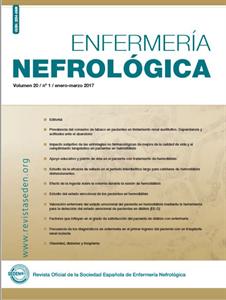Contenido del artículo principal
Resumen
Los pacientes en hemodiálisis tienen numerosas comorbilidades y limitaciones.
Objetivos: Evaluar el impacto en el cumplimiento y calidad de vida percibida de un programa de educación nutricional mediante técnicas motivacionales.
Material y Método: Estudio observacional transversal en pacientes en hemodiálisis. Se estableció una educación nutricional interactiva, medidas por el cuestionario validado KDQOL-SF™.
Resultados: Del total de 78 pacientes en hemodiálisis respondieron la encuesta 47. El 48,9% de los pacientes considera su salud de buena a excelente. El 61,7 y 38,3 % de los pacientes señala que la limitación de líquidos y la dieta les preocupan mucho o muchísimo. Tras la realización de programas educacionales se observa una reducción de la ganancia hídrica interdiálisis de 2,3 ± 1,05 vs 2,13 ± 1,06 (p <0,05).
Conclusiones: Las restricciones en la ingesta de líquido y dietéticas son las principales molestias. El empleo de educación nutricional mejora el cumplimiento.
Objetivos: Evaluar el impacto en el cumplimiento y calidad de vida percibida de un programa de educación nutricional mediante técnicas motivacionales.
Material y Método: Estudio observacional transversal en pacientes en hemodiálisis. Se estableció una educación nutricional interactiva, medidas por el cuestionario validado KDQOL-SF™.
Resultados: Del total de 78 pacientes en hemodiálisis respondieron la encuesta 47. El 48,9% de los pacientes considera su salud de buena a excelente. El 61,7 y 38,3 % de los pacientes señala que la limitación de líquidos y la dieta les preocupan mucho o muchísimo. Tras la realización de programas educacionales se observa una reducción de la ganancia hídrica interdiálisis de 2,3 ± 1,05 vs 2,13 ± 1,06 (p <0,05).
Conclusiones: Las restricciones en la ingesta de líquido y dietéticas son las principales molestias. El empleo de educación nutricional mejora el cumplimiento.
Palabras clave
HEMODIÁLISIS
CALIDAD DE VIDA
NUTRICIÓN
Detalles del artículo
Licencia
Aviso de derechos de autor/a
© Los autores ceden de forma no exclusiva los derechos de explotación de los trabajos publicados y consiente en que su uso y distribución se realice con la Licencia Creative Commons Atribución - No comercial 4.0 Internacional (CC BY-NC 4.0). Puede consultar desde aquí la versión informativa y el texto legal de la licencia. Esta circunstancia ha de hacerse constar expresamente de esta forma cuando sea necesario.
Cómo citar
1.
Ahís Tomás P, Peris Ambou IC, Meneu Oset M, Pérez Baylach CM, Bonilla Culebras B, Panizo González N. Impacto subjetivo de las estrategias no farmacológicas de mejora de la calidad de vida y el cumplimiento terapéutico en pacientes en hemodiálisis. Enferm Nefrol [Internet]. 2017 [consultado 13 Dic 2025];20(1):[aprox. 6 p.]. Disponible en: https://www.enfermerianefrologica.com/revista/article/view/4044




